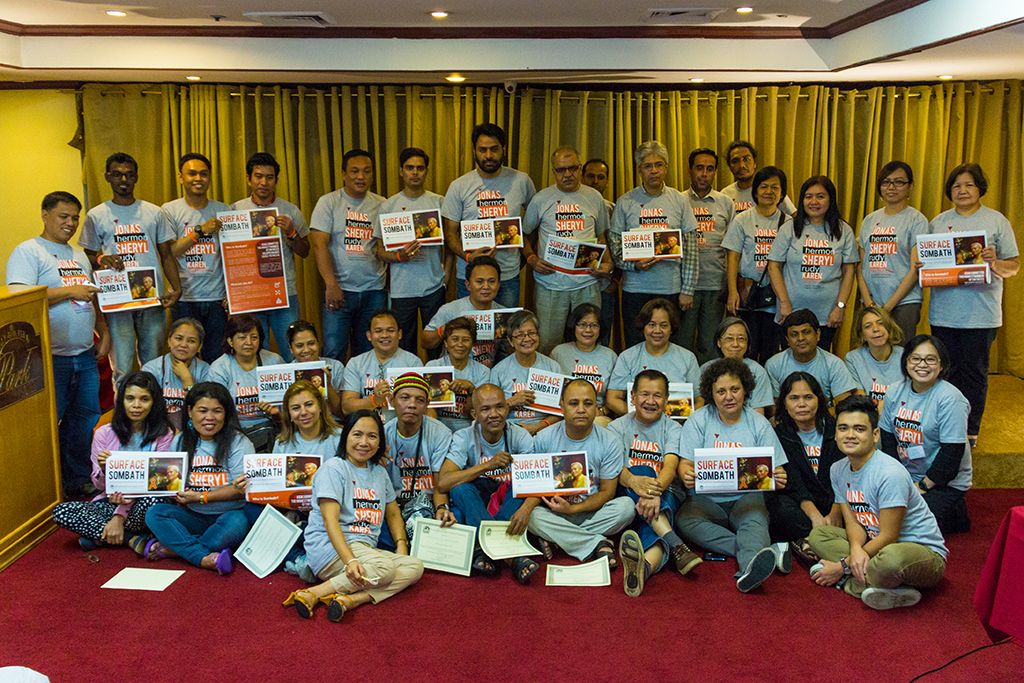Bayview Park Hotel, Manila, Philippines | July 17-20, 2014
 Group photo of conference participants and secretariat
Group photo of conference participants and secretariat
We gather for our Third Conference on Psychosocial Support in the Search for Truth and Justice for individual, family and community victims of enforced disappearance, torture, extrajudicial killing and allied human rights violations cognizant of the plurality of histories, cultures, political systems, and socio-economic settings of our countries of origin. Considering these diversities, we review and validate the applicability of the International Consensus on the Minimum Standards for Psychosocial Work in Search Processes and Forensic Investigations of Cases of Enforced Disappearance, Arbitrary or Extrajudicial Executions (Minimum Standards).
We express our deep concern over the ongoing aggression and genocidal attacks on Gaza by the Israeli government where children, women and innocent people are becoming victims. We strongly urge the immediate cessation of the aggression and genocidal attacks against the people of Gaza whose rights as Palestinians have been recognized by the international community.
The Minimum Standards recognizes the integrative and interdisciplinary link of psychosocial support to relevant fields of science, as well as law and politics. It encourages adoption of approaches based on empirical evidence, and applies modalities of healing and resiliency-building with proven efficacy. It supports efforts of survivors, relatives and supporters to demonstrate solidarity with each other, continue to be functional, and find meaning in life in the midst of suffering.
The Minimum Standards nears full implementation in Guatemala through civil society organizations’ (CSO) initiatives and steadfast engagements with appropriate government agencies. In Colombia, provision of psychosocial support is already mandated by law which among others recognizes the right of families of victims to choose their psychosocial provider. Despite the law, it is still the CSOs which are trusted by the victims and their families that provide psychosocial support, not the government. Hence, in Latin America, CSOs still need to continue pushing for the Minimum Standards’ full implementation not only as a CSO initiative but as a government’s reparative measure that signifies the State’s recognition of the severity of the harm inflicted on the victims and their families.
Asia, however, has lagged behind Latin America in applying the Minimum Standards in the search for truth and justice. This, notwithstanding some Philippine CSOs’ undertaking of human rightsbased psychosocial activities even prior to the introduction of the Minimum Standards. It remains that in the region, very few CSOs are aware of the Minimum Standards, and fewer are the governments that have heard about it. It is therefore imperative for us to actively pursue information drives among CSOs that can advocate for governments’ adoption of the Minimum Standards or formulation of policies on psychosocial support.
Toward this end, discussions and fora should be conducted not only to educate stakeholders but to generate inputs that can strengthen the psychosocial norms. These discourses should consider and/or resolve contentious issues pertaining to:
-
Adopting the Minimum Standards to the needs and cultures of peoples;
-
Modifying the psychosocial accompaniment framework to go beyond the mental health and biomedical perspectives;
-
Psychosocial service providers learning from the rich experiences of victims and families;
-
Proper use of “enforced disappearance” versus “missing”;
-
Developing the Minimum Standards as both pedagogical and advocacy tool;
-
Inclusion of psychosocial restitution as a form of reparation;
-
Sexual violence perpetrated against persons deprived of liberty;
-
Linking psychosocial support to antemortem data collection and exhumation, and strengthening the Asian regional coordination on forensics and exhumation work;
-
Exacting accountability from both State and non-State actors; and
-
Psychosocial-related provisions of the Convention against Enforced Disappearance (CED) and the Convention against Torture (CAT).
It is also recommended that the above issues be considered in a small committee tasked to improve and refine the form and content of the Minimum Standards which obviously needs perfecting amendments. These amendments can be enhanced if the full text of the document is revisited and reviewed to make the English translation more faithful to or improve on the original. It should be noted that the recommendations attached to the standards,which to date remain untranslated, should now have an English version that should at the very least follow very closely the original.
These discussions and campaigns for the adoption of the Minimum Standards should also take on the campaign for the ratification of the CED and the CAT as they embody pertinent provisions that can enhance psychosocial support. More importantly, both international instruments provide for strong preventive mechanisms against enforced disappearance and torture. Needless to stress, our greater mission is to protect persons from human rights violations, break impunity and end the culture of State violence, even as we continue to struggle with and for the people toward the fulfillment of our common aspirations for enduring peace and sustainable human development, in the search of which, our beloved desaparecidos offered their precious lives.
